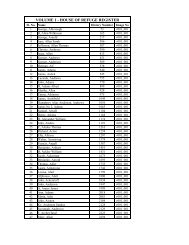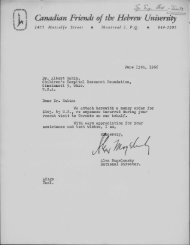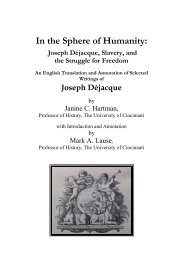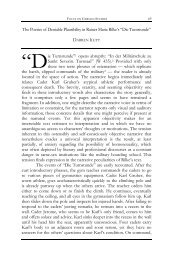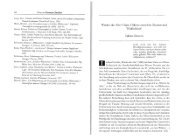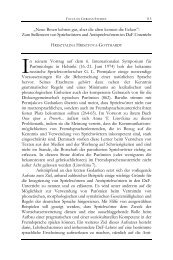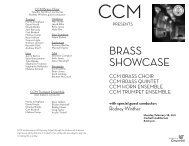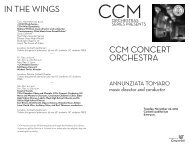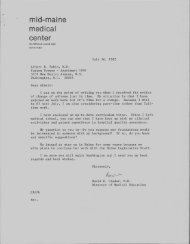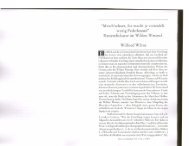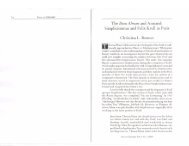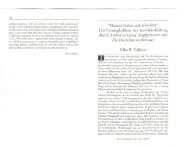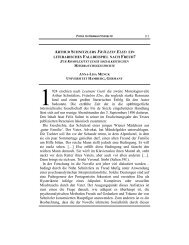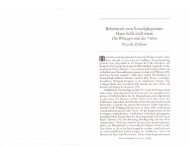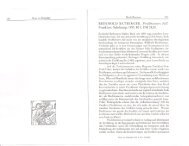Octavo, The Dale Warland Singers Program ... - UC DRC Home
Octavo, The Dale Warland Singers Program ... - UC DRC Home
Octavo, The Dale Warland Singers Program ... - UC DRC Home
You also want an ePaper? Increase the reach of your titles
YUMPU automatically turns print PDFs into web optimized ePapers that Google loves.
econciliation to resignation-and all<br />
of these experienced not just once, but<br />
repeatedly. <strong>The</strong> circular nature of this<br />
chain of emotions prompted me to<br />
cast the music as a cycle which stops<br />
(rather than concludes) at the point<br />
where it started and might very well<br />
begin allover again.<br />
<strong>The</strong> decision to use only percussion<br />
for the accompaniment was made<br />
primarily to avoid any specific<br />
historical connotations; like the<br />
human voice, percussion instruments<br />
can be both ancient and modern, a<br />
quality of timelessness they share<br />
with Catullus' poetry which, two<br />
thousand years before Freud, was<br />
examining the thin line that separates<br />
love from hate and the perplexing<br />
ambiguities of those passions.<br />
- Dominick Argento<br />
Liebeslieder Walzer, Op. 52<br />
by Johannes Brahms<br />
At thirty-six years of age Johannes<br />
Brahms made the decision to call<br />
Vienna his home, despite tempting<br />
offers of secure music positions in<br />
Germany. As if to affirm his spiritual<br />
affinity to Austria's "City of Dreams,"<br />
he composed eighteen stylized waltz<br />
songs - Vienna's earmark! Composed<br />
on texts of Friedrich Daumer, the<br />
songs describe the ups and downs of<br />
love in both folk-like convention and<br />
nature imagery. But unlike a song<br />
cycle, the pieces display no tight-knit<br />
organization or progression. Instead,<br />
they are short masterpieces of melodic<br />
invention, chromatic harmony, and<br />
rhythmic shifts all set to three-quarter<br />
time.<br />
Brahms provides contrast<br />
throughout by varying the ensemble<br />
with solos, songs for men and then<br />
women only, and inventive piano<br />
accompaniments. Worthy of any<br />
Strauss waltz, Brahms' songs capture<br />
the alluring, arched melodies and coy<br />
harmony of Viennese popular music,<br />
while exhibiting his own highly<br />
developed penchant for rhythmic and<br />
linear complexity. Uncharacteristically,<br />
Brahms expressed real satisfaction with<br />
these songs. <strong>The</strong>y were so successful,<br />
he composed another set (op. 65) in<br />
1874.<br />
- Alice Hanson<br />
Liebeslieder Polkas<br />
by P.D.g. Bach<br />
<strong>The</strong> Liebeslieder Polkas is the first<br />
opus of P.D.g. Bach's to be discovered<br />
in which he inflicted his music on the<br />
work of well-known poets, or even<br />
known poets for that matter. <strong>The</strong> fact<br />
that all the poets represented are<br />
English leads one to surmise that<br />
P.D.g.'s drinking companion<br />
Jonathan"Boozey" Hawkes had<br />
something to do with instigating the<br />
piece; Hawkes eventually married<br />
P.D.g. 's cousin Betty-Sue Bach and<br />
returned to his native Liverpool,<br />
where the two of them spent their<br />
senility publishing most of the<br />
unmourned composer's vocal music.<br />
As far as observing the integrity of<br />
these already-famous poems is<br />
concerned, P.D.g.'s attitude ranges<br />
from indifference to contempt. Some<br />
of the poems are set complete, others<br />
are rather haphazardly cut, some<br />
contain completely spurious<br />
interpolations, and in one case - Ben<br />
Jonson's beloved "Song to Celia" -<br />
the poem has been extensively<br />
rewritten to reflect the composer's<br />
besotted Weltanschauung.<br />
A word about the fifth hand in the<br />
piano part; when Brahms wrote his<br />
Liebeslieder Waltzes (in obvious<br />
imitation of P.D.g. Bach, but, as<br />
usual, without giving the earlier<br />
composer any credit) he scored the<br />
accompaniment for piano four hands;<br />
by adding a third person at the piano<br />
P.D.g. not only expanded the range of<br />
the accompaniment, but he also made<br />
sure that there was always one hand<br />
free for turning pages. Or, to look at it<br />
another way, he made life much more<br />
interesting for the page-turner.<br />
- Professor Peter Schickele<br />
19



